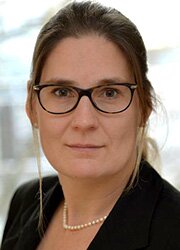Addictive Disorders
Adult Anxiety
Adult Obsessive States
Behavioural Medicine
Cross Cultural Issues
Sex, Marital and Family Relationships
Integrating Couple-based Approaches in Behaviour Therapy for Children
Nina Heinrichs, Braunschweig University of Technology, Germany
Integrating Couple-based Approaches in Behavior Therapy for Children
Nina Heinrichs, University of Braunschweig, Germany
Cognitive-behavior therapy for children has paid increasing attention to the role of parents in the etiology and maintenance of mental disorders in children and adolescents. There are several meta-analyses focusing on potential effects of including parents into the treatment of the child, specifically for younger children. Effect sizes vary by disorder and are usually the most prominent in interventions with children with oppositional-defiant disorder. Furthermore, family conflict is a well-established risk factor for mental disorders, and although less well researched, likely also for maintenance of treatment success. Fairly often, conflictual interactions are also occurring during treatment, in-session, between a parent and a child or between two parents as a couple. This workshop will demonstrate how to deal with conflictual interactions, specifically between parents as a couple, when the child was brought into treatment. A specific focus will be on couples in marital discord or with relationship distress. This workshop will, however, not deal with mediation after divorce. The workshop will present how to integrate components of empirically supported treatments for couple distress when managing parents and their interactions in child treatment. A specific focus on communication and conflict management as well as mutual support strategies and dyadic coping (as prominent and modifiable risk and protective factors in relationships) will be visited and practiced based on case examples.
Key learning objectives:
Attendees will learn:
- The principles of couple-based intervention strategies for parents of a child with mental health difficulties;
- How to implement couple-based approaches with parents into behaviour therapy for children and
- Advantages, difficulties, and therapeutic challenges of such an (integrated) approach.
Implications for everyday clinical practice of CBT
Parents struggling as a couple and in their partner role as a parent (e.g. in their parental alliance) can be frequently observed in clinical practice. How to deal in session with these (dysfunctional) behaviors of parents is a challenge for every child CBT therapist. It may be very useful to learn some basic techniques how to address these issues when delivering services to children and their families
Dr. Heinrichs is professor for clinical psychology and psychotherapy, and director of the university outpatient clinic for children, adolescents and adults. She has worked as a researcher and practitioner in a variety of clinical settings in Germany and abroad, among them long-term stay at the Center for Anxiety and Related Disorders at Boston University (adult mental health, specifically anxiety disorders), and short-term stays at the Parenting and Family Support Centre at the University of Queensland (child mental health and parenting), and the Cancer Support Centre (cancer and couples), Griffith University, in Brisbane, Australia. She is a licensed psychotherapist, working with children and adults, and she is trained in two couple interventions programs. She has published in the area of anxiety disorders in children and adults, and in prevention and early intervention with children and couples who face threats to their physical or psychological health.
References
Heinrichs, N., Cronrath, A.–L., Degen, M. & Snyder, D. K. (2010) The link between child emotional and behavioral problems and couple functioning. Family Science, 1: 3, 152-172
Benson, L. A., McGinn, M. & Christensen, A. (2012). Common principles of couple therapy. Behavior Therapy, 43 (1) , 25-35.
A Cognitive Behavioural Systems Approach to Sexual and Couple Problems
Mehmet Sungur, Marmara University Hospital, Istanbul, Turkey
A Cognitive Behavioural Systems Approach to Sexual and Couple Problems
Mehmet Sungur, Medical School of Marmara University, Turkey
Did you recently finish your own cognitive behaviour therapy (CBT) training and discover you were One of every two to three marriages end up in divorce and many other negative consequences emerge following an unsuccessful marriage. This presentation will start by discussing the reasons why people insist to marry despite the high (45-50%) divorce rate and some catastrophic outcomes following unhappy marriages and divorce. Surprisingly, despite the trauma of divorce, the majority will choose to repeat the experience as the breakdown is seen as the other partner’s fault. The presentation will carry on by discussing whether the problem in a failing relationship is really the problematic partner and what makes the distinction between happy (successful) and unhappy marriages.
In cognitive behavioural systems approach the therapist attempts to reframe the problem as a result of interaction between the partners rather than arising from one of the partners. This is to shift the couple’s thinking from the illness model to the interactional model. In this approach, the focus of therapist attention is the relationship rather than the individual and thus communication training, reciprocal negotiation and mutual problem solving become very important components of treatment. The workshop will progress by explaining how the therapist may at one moment be working behaviourally trying to help the couple communicate better and solve their problem directly or working at a cognitive level to teach couple to identify automatic thoughts, distorted thinking and how to modify the cognitive processes that lead partners to exhibit certain repetitive patterns of behaviour. It will also discuss the advantages of working on a systems level to explain their lack of co-operation and progress and provide meaning to what seems meaningless to couples and therapists. Different types of couple problems demand different therapeutic skills and responses. Whatever treatment approach is used, a good assessment and formulation is of great importance for a successful intervention, particularly in those couples presenting with relationship and sexual problems. Making conceptualizations, setting targets and homework assignments with the couple will also be discussed.
Some therapy failures with relationship problems may result from a mismatch between the intervention applied and the specific needs of the couple. This presentation will try to help simplify the process of making choices about which intervention may be most effective with which couple and how therapists may select interventions which are appropriate to the different levels of complexity and rigidity in a couples interaction by using an innovative system. Challenges and critiques to the old and new DSM criteria will be made and basic therapeutic interventions to sexual problems will be discussed.
Key learning objectives:
- The participants will be able to learn the basic therapeutic approaches and treatment principles for sexual disorders
- Participants will be able to understand the rational behind the changes made in DSM5 diagnostic criteria for sexual disorders.
- Participants will be able to learn the behavioural , cognitive and systems approach to couple problems.
Implications for everyday clinical practice of CBT
Sexual and relationship problems have negative impact on majortiy of couples in daily life. An increasing number of couples come forward to seek help for couple and sexual problems.This workshop will help improve therapists competence to handle a variety of couple-relationship-sexual problems.
Mehmet Sungur is a professor of psychiatry working at the Medical Faculty of Marmara University. He had his postgraduate training in cognitive behaviour therapy (CBT), sexual and marital therapies at the Institute of Psychiatry, London. He is the president of the International Association for Cognitive Psychotherapy (IACP). He is one of the past presidents of the European Association for Behavioural and Cognitive Therapy (EABCT). This year he has been elected as the incoming president of the European Federation of Sexology (EFS). He published numerous articles in national and international scientific journals and presented workshops and keynotes in hundreds of national and international congresses. Mehmet Z. Sungur has received some national and international awards including the “Gold Medal from European Federation of Sexology”. He is on the advisory and/or editorial board of many national and international journals. He has currently committed himself to the training of mental health professionals in clinical applications of CBT and sex therapy both in Turkey and abroad. He has been the president of 7 international congresses including the recent 47th EABCT Congress and many national congresses about CBT and sex therapy. He is running training courses and certified CBT training programmes for a large number of mental health professionals in Turkey and abroad.
References
Sungur, M. Z., & Gündüz, A. (2014). A comparison of DSM‐IV‐TR and DSM‐5 definitions for sexual dysfunctions: Critiques and challenges. The journal of sexual medicine, 11(2), 364-373.
Sungur, M. Z. (2016). Helping Marriages That Suffer from Relationship Problems: A Cognitive Behavioural Systems Approach. Journal of Evidence-Based Psychotherapies, 16(1), 19.
Sungur, M. (2017). Cognitive behavioral couple therapy. In A. Wenzel (Ed.), The sage encyclopedia of abnormal and clinical psychology (Vol. 1, pp. 726-728). Thousand Oaks,, CA: SAGE Publications, Inc. doi: 10.4135/9781483365817.n277









